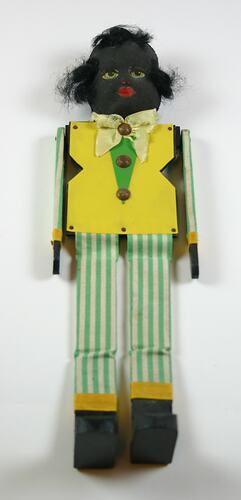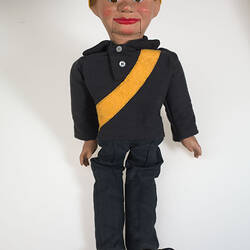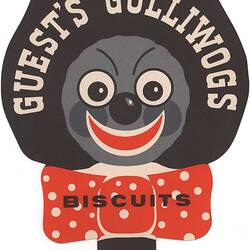Summary
Note: This object is a derogatory depiction of a particular cultural group. Such depictions are not condoned by Museums Victoria which considers them to be racist. Historical distance and context do not excuse or erase this fact.
Black wooden male figure, with movable arms and legs and a cloth face. It was designed to be jiggled around to simulate dancing. It was produced by Leo Sterne in his factory in Leicester Street, Carlton the late 1940s.
Physical Description
A male puppet, consisting of a flat wooden body and head, painted black, on which a moulded cloth face and hair has been attached. Movable wooden arms have been nailed to each shoulder, which are covered with green and white striped cloth, with painted black hands. Nailed to the bottom of the body are jointed wooden legs which are encased in green and white cloth pants, with black painted feet. On the front of the body is attached yellow and green plastic, to represent a jacket, with three drawing pins for buttons and a yellow cloth bowtie. A thick piece of wood is attached to the back, along the shoulder, in which is a large hole, intended for a wooden rod (not present.)
Significance
The collection of Melbourne Toy manufacturer L.J.Sterne (Leo J. Sterne) was donated to the History Collection of Museum Victoria in 1990 by the executers of his estate. Containing over 300 items it is, however, largely a paper-based collection, featuring catalogues, advertising brochures, flyers, packaging, photographs and certificates, as well as some doll parts (such as limbs, eyes and wigs) and other items from the manufacturing process. There are only around seven or eight examples of the company's finished product (most of which came from other sources than the Sterne Estate donation), so the head and the jig dolls are wonderful additions to the collection. They fit in perfectly with the proposed future collecting directions of the Museum's Childhood Collection Policy, which is to focus on acquiring Victorian manufactured toys, particularly those which build on existing collections. As objects, they also enhance the display potential of the L.J. Sterne collection in looking at manufacturing in Melbourne and its decline, early children's television production, and Sterne as an immigration story.
The jig dolls have added interest as an example of the way non-europeans have been represented in manufactured goods in Australia.
The vendor is the niece of Leol Sterne, and was left the items after he died.
More Information
-
Collection Names
-
Collecting Areas
-
Acquisition Information
Purchase
-
Manufacturer
Sterne Doll Company, 121-123 Leicester Street, Carlton, Greater Melbourne, Victoria, Australia, 1945-1950
-
Classification
-
Category
-
Discipline
-
Type of item
-
References
Email correspondence from vendor (copies printed for supplementary file.) `Gerry Gee and Me', Ron Blaskett (2001); `The Encyclopedia of Australian Dolls', Marjory Fainges (1993)
-
Keywords


